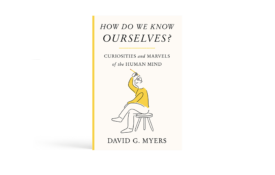-

Why Is Everyone Else Having More Fun? Part 2 of 3 With David Myers
Social psychologist David Myers joined Under the Cortex to speak about his new book and why we tend to think that everyone else is having more fun than us.
-

New Content From Current Directions in Psychological Science
A sample of articles on ADHD, how nervous systems process information about quantities, the tactile system, uncertainty, the agents of influence, and much more.
-

Was I Happy Then? Our Current Feelings Can Interfere with Memories of Past Well-Being
One reason happiness can seem so elusive is that our current feelings can interfere with memories of our past well-being. Analysis of four longitudinal surveys.
-

Deprivation May Explain the Link Between Early Adversity and Developmental Outcomes in Adolescence
Early deprivation experiences, such as parental neglect, appear to be more closely associated with cognitive and emotional functioning in adolescence than early threat experiences, such as exposure to abuse.
-
Content Moderators Pay a Psychological Toll to Keep Social Media Clean. We Should Be Helping Them
Content moderators are the unsung heroes of the internet. They work in a growing field which upholds the social media infrastructure of today. But keeping us safer, by constantly seeing and filtering the worst content online, takes its toll. Can people really cope with this constant barrage of horror? One of the main handbooks for psychologists, the DSM-5, includes ‘indirect exposure to aversive details’ in the category of post-traumatic stress disorder. In extreme circumstances this can result in what is often called ‘secondary trauma’. Secondary trauma can happen when people, such as first responders, deal with victims in distress.
-
Anxiety Does Not Cause Bad Results in Exams
Exams are nerve-racking, especially for those already of an anxious disposition. The silence of the hall; the ticking of the clock; the beady eye of the invigilator; the smug expression of the person sitting at the neighbouring desk who has finished 15 minutes early. It therefore seems hardly surprising that those who worry about taking tests do systematically worse than those who do not. What is, perhaps, surprising, according to research published recently in Psychological Science by Maria Theobald at the Leibniz Institute for Research and Information in Education and her colleagues, is that it is not the pressure of the exam hall which causes the problem. It is the pressure of revision.

